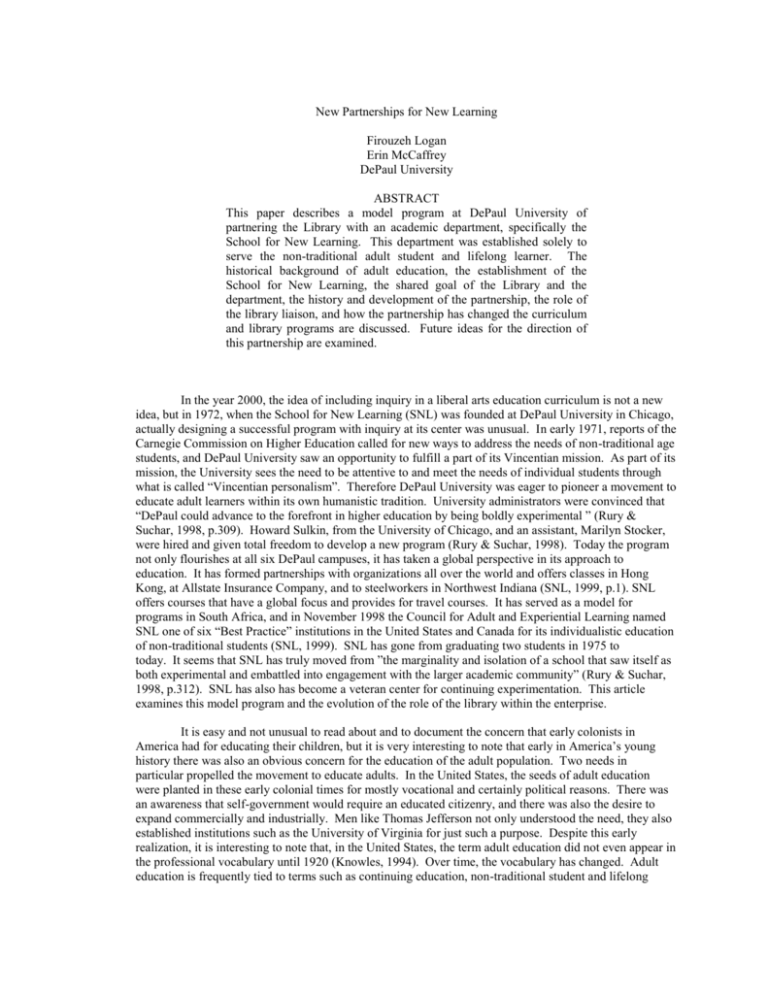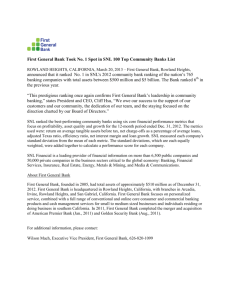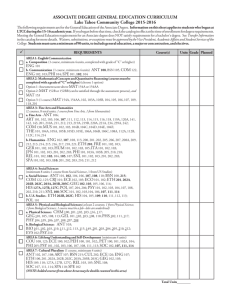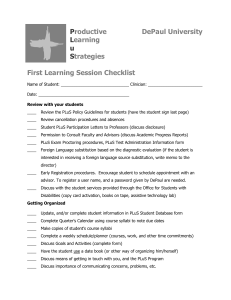Microsoft Word
advertisement

New Partnerships for New Learning Firouzeh Logan Erin McCaffrey DePaul University ABSTRACT This paper describes a model program at DePaul University of partnering the Library with an academic department, specifically the School for New Learning. This department was established solely to serve the non-traditional adult student and lifelong learner. The historical background of adult education, the establishment of the School for New Learning, the shared goal of the Library and the department, the history and development of the partnership, the role of the library liaison, and how the partnership has changed the curriculum and library programs are discussed. Future ideas for the direction of this partnership are examined. In the year 2000, the idea of including inquiry in a liberal arts education curriculum is not a new idea, but in 1972, when the School for New Learning (SNL) was founded at DePaul University in Chicago, actually designing a successful program with inquiry at its center was unusual. In early 1971, reports of the Carnegie Commission on Higher Education called for new ways to address the needs of non-traditional age students, and DePaul University saw an opportunity to fulfill a part of its Vincentian mission. As part of its mission, the University sees the need to be attentive to and meet the needs of individual students through what is called “Vincentian personalism”. Therefore DePaul University was eager to pioneer a movement to educate adult learners within its own humanistic tradition. University administrators were convinced that “DePaul could advance to the forefront in higher education by being boldly experimental ” (Rury & Suchar, 1998, p.309). Howard Sulkin, from the University of Chicago, and an assistant, Marilyn Stocker, were hired and given total freedom to develop a new program (Rury & Suchar, 1998). Today the program not only flourishes at all six DePaul campuses, it has taken a global perspective in its approach to education. It has formed partnerships with organizations all over the world and offers classes in Hong Kong, at Allstate Insurance Company, and to steelworkers in Northwest Indiana (SNL, 1999, p.1). SNL offers courses that have a global focus and provides for travel courses. It has served as a model for programs in South Africa, and in November 1998 the Council for Adult and Experiential Learning named SNL one of six “Best Practice” institutions in the United States and Canada for its individualistic education of non-traditional students (SNL, 1999). SNL has gone from graduating two students in 1975 to today. It seems that SNL has truly moved from ”the marginality and isolation of a school that saw itself as both experimental and embattled into engagement with the larger academic community” (Rury & Suchar, 1998, p.312). SNL has also has become a veteran center for continuing experimentation. This article examines this model program and the evolution of the role of the library within the enterprise. It is easy and not unusual to read about and to document the concern that early colonists in America had for educating their children, but it is very interesting to note that early in America’s young history there was also an obvious concern for the education of the adult population. Two needs in particular propelled the movement to educate adults. In the United States, the seeds of adult education were planted in these early colonial times for mostly vocational and certainly political reasons. There was an awareness that self-government would require an educated citizenry, and there was also the desire to expand commercially and industrially. Men like Thomas Jefferson not only understood the need, they also established institutions such as the University of Virginia for just such a purpose. Despite this early realization, it is interesting to note that, in the United States, the term adult education did not even appear in the professional vocabulary until 1920 (Knowles, 1994). Over time, the vocabulary has changed. Adult education is frequently tied to terms such as continuing education, non-traditional student and lifelong learner. Whatever the terminology, it is clear that in the last thirty years, adult education has moved from the periphery of the educational psyche to the center. Historically, adult education institutions were attached to agencies established for other purposes and therefore were perceived to hold a slightly inferior status in the institutional hierarchy. The purpose of universities was seen to be the preservation of old knowledge. In time, the purpose shifted to the cultivation of morally responsible leaders. College was viewed as a way to bring “a higher tone to the public mind” (Knowles, 1994, p.32). Today the purpose of most modern universities remains the transmission of existing knowledge and the cultivation of future leaders. However, change is afoot. And this change is fueled by a 20th century phenomenon: “the time span of cultural revolution has for the first time in history become compressed into less than the lifetime of an individual” (Knowles, 1994, p.272). Generations no longer live in conditions that governed past generations, and important changes take place within one life span – not over the time span of several generations. This pace of social and technological change dictates that adults must engage in self-improvement for reasons that can range anywhere from mere entertainment to survival. One result of this phenomenon is that neither the needs of the individual nor the needs of society as a whole is best served by an educational system that merely transmits knowledge. The focus of education has shifted from the transmission of knowledge to the individual’s capacity to learn. It is increasingly clear that education today must allow for the creation of new culture – it must teach how to understand what is not yet known. The theory is that this is best taught through the process of inquiry, and that education is no longer a function only of an individual’s youthful years, but a lifelong process. Many adult education programs have been engaged in this process for many years. Consequently, for the last thirty years, adult education programs, once ignored and in the academic cellar, are being dusted off and examined, new ones developed, and some even emulated by more traditional programs. If learning is to be a lifelong adventure, then program designers must provide not only adult learners, but also young learners with the tools to engage in this process of inquiry. “Like it or not, we live in a age when knowledge itself is continually being shaped and recast to new purposes, and research methodology – formal inquiry – is emerging as a critical body of knowledge in its own right, and constantly changing itself” (Rury, 1996, p.187). The School for New Learning at DePaul University is best described as an interdisciplinary, competence based liberal arts college for adults of 24 years of age and older. This program “ was one of the first university-wide efforts in the nation to address and serve the needs of the adult student” (Firestone, 1987, p.4). The school was established in 1972 as a separate degree-granting college of DePaul University with its own Dean. Then in 1984 a masters program was designed for experienced practitioners who worked in new or rapidly changing fields or those who wanted to take existing fields of practice into new directions. In order to keep the school dynamic and responsive to change, the program designers mandated regular self-examination and evaluation, and early on it was recommended that classes be taught away from the traditional campuses. SNL was in fact the first DePaul program to be offered in the Chicago suburbs. In the early stages of adult education, both curriculum and teaching methods were borrowed from traditional schools, but over the years it had become clear that adults were different from the youth for whom those traditional programs were designed. Howard Sulkin and his associates were well aware of these differences, and designed a program to meet the needs of students who had less time available for their studies, brought more resources to the learning transaction and who came to school with a clearer purpose for learning. The curriculum is very non-traditional and very openly recognizes that adult students already bring knowledge and experience to the table, and therefore is less concerned with the transmission of knowledge and more concerned with the development of critical skills. Students are able to accelerate their progress towards a degree by using experience as well as class work for academic credit and are able to design their own programs with help from their advisory board. Rather than earn credit in the traditional manner of hours of credit earned, students are assessed on competency in five domains, each of which is comparable to a discipline found in a traditional liberal arts program. In light of this very non-traditional program, faculty members have had to develop new approaches to teaching and advising. In SNL the teaching load of an instructor incorporates the time outside the classroom that is spent advising and working individually with students, and “the role of the instructor is less one of providing subject matter expertise and more one of modeling effective learning behavior” (Justice, 1997, p.32). Faculty members are seen as both role models and mentors for students. In developing a program that would accomplish all this, the School’s founders made certain assumptions: The School should develop the whole person, including skills and attitudes as well as knowledge. Student growth should be recognized in terms of competence rather than in terms of course accumulation. Students should be able to receive “credit” for appropriate learning gained through prior experiences, regardless of the nature or timing of those experiences. The School should equip adults to engage in constructive, self-directed lifelong learning. Students should bear the major responsibility and authority for designing and completing their own degree programs. The School should provide appropriate counseling and other support services so that the students may exercise their academic responsibilities fully and efficiently. The School should de-emphasize administrative rigidities and emphasize flexible scheduling. (Firestone, 1987, p.7) Underlying these assumptions was the notion that adults must possess certain skills in order to survive, adapt and advance in an ever-changing environment, and the core skill in this inquiry-driven program is the ability to do formal research. “The School for New Learning has made research – labeled ‘formal inquiry’ – a central facet of liberal education, or as SNL puts it, a part of being an educated adult in contemporary society” (Rury, 1996, p.188). The program has a Lifelong Learning competence framework that is composed of the only series of courses that is required of all students, and it is within this framework that the Library and the School for New Learning partner in teaching students a wide range of research methodology. If inquiry or research is the “central facet” of SNL’s program then the Library also has a central role to play: providing both students and faculty the tools with which to proceed with this research. The Library and SNL have a shared goal: to provide students with skills for lifelong learning. Given the multidisciplinary and non-traditional design of the SNL program, faculty are not expected to know or even be aware of all of the resources each student needs and has access to – this is the responsibility of the librarian. Therefore the faculty serve as advocates for our librarians and our resources. The Library, in turn, tries to communicate an understanding of the SNL program to the students. The Library did not become a full partner in this venture from the very beginning; it was a reluctant participant at first. The very first contact was made in 1978. A library research workbook that had been designed for traditional, first year English composition students was made available to SNL students. For many years this workbook sat in a three ring binder at the reference desk. Students photocopied the exercises and were required to complete them at one of the Chicago campuses. Even though the workbook was modified over the years, it was not a really good or convenient tool for these adult students. In the early 1990’s, because of the SNL program, efforts were made to establish a greater library presence at the suburban campus locations. Once in place librarians initiated contact with very basic public relations. Suburban campus librarians introduced themselves to classes and offered library orientation. This wasn’t quite enough, and the next organized effort involved collecting syllabi from the classes offered in the suburbs to try and assess what library users needed, to try and target which classes were the most logical courses for bibliographic instruction, and to assist in curriculum development (Bean & Klekowski, 1993). This led to developing course-integrated bibliographic instruction. Two courses were considered for the first tier of the undergraduate program: Foundations of Adult Learning and College Writing, both of which are taken early in the undergraduate program and are part of the Lifelong Learning Area. This area “focuses on the essential skills students need to become productive adult learners” (School for New Learning, 1999, p.7). Foundations of Adult Learning is required for all students. The course is taught by a full-time faculty member who becomes the student’s faculty mentor throughout that student’s time in the SNL program. The competence statements fulfilled in this course are “can use one’s ideas and those of others to draw meaning from experiences” and “can design learning strategies to attain personal and educational goals” (School for New Learning, 1999, p.7). College Writing is not required of all students. Successful completion of the writing portion of the SNL proficiency exam allows a student to waive the course. An adjunct faculty member generally teaches this course. The competence statement fulfilled in this course is “can write clearly and fluently” (School for New Learning, 1999, p.7). After a couple of years of targeting both classes and too often teaching the same students within the same year, it was decided that Foundations of Adult Learning would be the only targeted course for the first tier of bibliographic instruction. The second tier of bibliographic instruction was designed for the Research Seminar course, a required research methods course. Students “learn to identify a set of research questions, define hypotheses, perform a critical analysis and review of existing research literature on a topic, and to outline their own proposed methodology for studying it directly” (Rury, 1996, p.190). The competence statement fulfilled in this course is “can pose questions and use methods of formal inquiry to answer questions and solve problems” (School for New Learning, 1999, 7). Students in this course “become intimately familiar with the library (especially the periodicals) and with the protocols of various research traditions…” (Rury, 1996, p.190). However, contact between the Library and SNL was neither routine nor organized. As SNL is not an identifiable subject area, it does not have a regular bibliographer. Instead there is a library liaison person. There are no collection development funds for SNL materials since their programs are interdisciplinary. The library liaison to SNL then mediates between SNL faculty purchase requests and bibliographers. Not until 1992 was it a stated goal of the Library to fully integrate the Library into the SNL program. It became the priority of the liaison librarian at the time, Paula Dempsey. After a particularly successful instruction session for a Foundations class, Paula had discussions with the department about formalizing the relationship. She redesigned the workbook, creating a much more appropriate assignment that, to the delight of suburban students could be completed at any academic library. The Library was responsible for getting the workbook published and sold through the University bookstores. Bibliographic instruction also became a regularly scheduled affair for the two targeted undergraduate classes. (P.Dempsey, personal communication, November 5, 1999). The final goal was targeting the Masters program. The Master of Arts Program in Integrated Professional Studies is composed of the Focus Area, Liberal Learning seminars, and the Learning Plan Research and Development and Learning Plan Review courses. It was decided to give bibliographic instruction during the Learning Plan Research and Development course, which is the first course in the M.A. program. Here, students explore “the aims of graduate education with particular focus on the program of study leading to a Master of Arts in Integrated Professional Studies” (School for New Learning, 1999, p.9). Today at DePaul University, bibliographic instruction is most consistently given to SNL courses. The Library targets other courses in other departments, but no other department gets the consistent attention that SNL does. The Library can offer instruction to almost 100% of the courses that are targeted. The library liaison to SNL usually teaches all the off campus classes and tries to teach at least one course at each suburban campus location throughout the academic year, and the Suburban Reference/Instruction librarians teach the remaining courses. The partnership is becoming strong enough that the current liaison to SNL, Arlie Sims, was invited to visit Hong Kong in 1999 to provide bibliographic instruction to SNL students at the International Bank of Asia. The director of SNL’s Hong Kong program thought library representation would be beneficial to the students and sought support from the Dean of SNL and the College of Commerce, who also have a program in Hong Kong (A. Sims, personal communication, October 15, 1999). As a result of the trip, the Library designed a web page specifically to meet the needs of these international students. As technology has advanced, the workbook has once again evolved - from a physical item to an online tutorial, the Library Research Tutorial (LRT). The LRT was designed to offer greater flexibility for SNL students, in the suburbs, Hong Kong or anywhere else they are taking classes. Currently, two of the six assignments must be completed in an academic library, and the remaining four assignments can be completed online. Arlie Sims participated in meetings and discussions for curriculum planning when SNL was changing their grid in 1999, and the LRT was updated to meet the new technology requirements of SNL. Librarians also occasionally serve as professional advisors to students in SNL. Students choose the members of their Academic Committee after completing the Foundations of Adult Learning (in the undergraduate program) or Learning Plan Research and Development (in the graduate program). The students, their faculty mentor, and a professional advisor comprise the Academic Committee. The professional advisor offers expertise and guidance in the student’s field of interest. Students with the help of the advisor and faculty mentor proceed then to create competencies for their Individual Focus Area to fit their professional and personal goals Just as SNL undergoes regular evaluation so does the Library. Once again, the Library is reassessing the LRT to make it more of an interactive research guide, and to insure that DePaul’s SNL students do not burden other area academic libraries with their assignments. There is also discussion underway now to have a librarian assigned to each Foundations of Adult Learning class. Much like the faculty member is an advisor and mentor, so would the librarian be a resource for the students of that class throughout their SNL program. The classes targeted for instruction are also being evaluated to decide whether it would not be more productive to shift instruction from Foundations of Adult learning to College Writing. What is not under discussion is putting less time and energy into this partnership. The partnership between SNL and the Library has been a collaboration that has truly benefited the students, faculty and the librarians involved. It is often remarked that teaching an adult student is a learning experience for those doing the teaching – the teacher becomes a co-learner and a collaborator in this process of inquiry. This partnership with SNL has allowed the Library to expand its horizons and experiment with very creative approaches to research. It has also provided a model for partnerships with other departments interested in preparing students for lifelong learning. . Collaborative partnerships have been an integral part of the success of SNL, and the Library can learn much from their example. The Library must make the partnership a priority and have librarians whose priority it is to further the partnership that achieves the goal. Ideally the goal would be: “In a totally educative community everybody would be always partly a teacher and partly a learner; highest social approval would be reserved for those activities and those persons concerned with improving the quality of human competence” (Knowles, 1994, p.279). In reality the goal can at least be that all the partners (students, faculty and librarians) become facilitators and resource persons of lifelong learning. References Bean, R. & Klekowski, L. M. (1993). Course syllabi: extracting their hidden potential. In C. J. Jacob (compiler), The Sixth Off-Campus Library Services Conference Proceedings (pp. 1-9). Mount Pleasant, MI: Central Michigan University. Firestone, Beverly. (1987). The School for New Learning: A Time Tested Model of the Future. Chicago: DePaul University. Justice, David. (1997). Facilitating Adult Learning in a Liberal Education Context. Liberal Education, 83, 28-33. Knowles, Malcolm S. (1994). A History of the Adult Education Movement in the United States. Florida: Krieger Publishing Company. Rury, J. L. (1996). Inquiry in the general education curriculum. JGE: The Journal of Education, 45 (3), 175-196. Rury, J.L. & Suchar, C.S. (Eds.). (1998). DePaul University: Centennial Essays and Images. Chicago: DePaul University. School for New Learning. (1999). Bachelor of Arts Degree program guide. Chicago: DePaul University. School for New Learning. (1999, Summer). Common Knowledge, 11, 1. School for New Learning (1999, Fall). Common Knowledge, 11, 2. School for New Learning. (1999). The Master of Arts Program in Integrated Professional Studies. Chicago: DePaul University.







